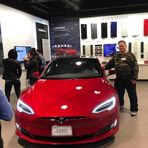Rivian's Leap: A $5.8 Billion Boost from Volkswagen
November 13, 2024, 9:54 pm
Volkswagen
Location: Germany, Lower Saxony, Wolfsburg

Location: United States, Texas, Austin
Employees: 10001+
Founded date: 2003
Total raised: $3.86B

Location: United Kingdom, England, City of London
Employees: 1001-5000
Founded date: 1950
Rivian Automotive is riding a wave of optimism. The electric vehicle (EV) maker saw its shares soar over 15% after announcing a monumental $5.8 billion investment from Volkswagen. This partnership is not just a financial lifeline; it’s a strategic alliance that could reshape the EV landscape.
The timing of this investment is crucial. Rivian is at a crossroads. The company aims to cut costs and achieve profitability while launching its new R2 SUV, designed for budget-conscious consumers. This vehicle could be the key to unlocking a broader market. Rivian’s ambition is clear: to carve out a significant share of the EV market, competing directly with giants like Tesla.
However, Rivian is not without its challenges. The company has faced a series of hurdles, including a parts shortage that forced it to lower its annual production forecast. This setback came just as Rivian reported third-quarter revenues that fell short of expectations. The company’s shares have plummeted nearly 55% this year, underperforming its rivals. Investors are understandably cautious.
The joint venture with Volkswagen is a beacon of hope. It promises to integrate advanced electrical infrastructure and Rivian’s software technology into future electric vehicles. This collaboration could establish Rivian and Volkswagen as a formidable force in the Western EV market, second only to Tesla. Analysts suggest that this partnership alleviates a significant portion of Rivian’s capital concerns, providing a much-needed boost to its financial stability.
Yet, the landscape is shifting. With political changes on the horizon, the future of EV support in the U.S. appears uncertain. The return of Trump to the White House raises questions about policy direction. Rivian, along with other EV manufacturers, may find itself navigating a more challenging regulatory environment. The specter of reduced EV tax credits looms large, potentially impacting sales and profitability.
Competition is fierce. Rivian faces a crowded field of rivals, all vying for consumer attention. The market is evolving rapidly, with new players entering the fray. To succeed, Rivian must not only innovate but also scale its operations effectively. The company’s ability to ramp up production and meet consumer demand will be critical.
Investors are watching closely. If Rivian can maintain its recent gains, it stands to add over $1.6 billion to its current market value of $10.8 billion. This influx of capital could provide the resources needed to navigate the challenges ahead. The investment from Volkswagen is more than just money; it’s a vote of confidence in Rivian’s potential.
Rivian’s journey is emblematic of the broader EV market. The industry is at a pivotal moment, with traditional automakers and new entrants racing to capture market share. As consumer preferences shift towards sustainability, the demand for electric vehicles is set to grow. Rivian’s ability to position itself as a leader in this space will depend on its strategic decisions in the coming months.
The partnership with Volkswagen could be a game-changer. It not only provides financial support but also access to Volkswagen’s extensive expertise in automotive manufacturing. This collaboration could enhance Rivian’s production capabilities, allowing it to scale more efficiently. The integration of advanced technologies will be crucial in creating vehicles that meet the evolving needs of consumers.
As Rivian moves forward, it must remain agile. The automotive landscape is changing rapidly, driven by technological advancements and shifting consumer preferences. Rivian’s focus on affordability with the R2 SUV is a smart move, targeting a segment of the market that is often overlooked by premium brands. This strategy could help the company capture a wider audience and drive sales.
In conclusion, Rivian stands at a critical juncture. The $5.8 billion investment from Volkswagen provides a much-needed boost, but challenges remain. The company must navigate a complex landscape of competition, regulatory uncertainty, and production hurdles. Success will depend on its ability to innovate, scale, and adapt to changing market dynamics. The road ahead is fraught with obstacles, but with the right strategy, Rivian could emerge as a key player in the electric vehicle revolution. The future is electric, and Rivian is poised to take the wheel.
The timing of this investment is crucial. Rivian is at a crossroads. The company aims to cut costs and achieve profitability while launching its new R2 SUV, designed for budget-conscious consumers. This vehicle could be the key to unlocking a broader market. Rivian’s ambition is clear: to carve out a significant share of the EV market, competing directly with giants like Tesla.
However, Rivian is not without its challenges. The company has faced a series of hurdles, including a parts shortage that forced it to lower its annual production forecast. This setback came just as Rivian reported third-quarter revenues that fell short of expectations. The company’s shares have plummeted nearly 55% this year, underperforming its rivals. Investors are understandably cautious.
The joint venture with Volkswagen is a beacon of hope. It promises to integrate advanced electrical infrastructure and Rivian’s software technology into future electric vehicles. This collaboration could establish Rivian and Volkswagen as a formidable force in the Western EV market, second only to Tesla. Analysts suggest that this partnership alleviates a significant portion of Rivian’s capital concerns, providing a much-needed boost to its financial stability.
Yet, the landscape is shifting. With political changes on the horizon, the future of EV support in the U.S. appears uncertain. The return of Trump to the White House raises questions about policy direction. Rivian, along with other EV manufacturers, may find itself navigating a more challenging regulatory environment. The specter of reduced EV tax credits looms large, potentially impacting sales and profitability.
Competition is fierce. Rivian faces a crowded field of rivals, all vying for consumer attention. The market is evolving rapidly, with new players entering the fray. To succeed, Rivian must not only innovate but also scale its operations effectively. The company’s ability to ramp up production and meet consumer demand will be critical.
Investors are watching closely. If Rivian can maintain its recent gains, it stands to add over $1.6 billion to its current market value of $10.8 billion. This influx of capital could provide the resources needed to navigate the challenges ahead. The investment from Volkswagen is more than just money; it’s a vote of confidence in Rivian’s potential.
Rivian’s journey is emblematic of the broader EV market. The industry is at a pivotal moment, with traditional automakers and new entrants racing to capture market share. As consumer preferences shift towards sustainability, the demand for electric vehicles is set to grow. Rivian’s ability to position itself as a leader in this space will depend on its strategic decisions in the coming months.
The partnership with Volkswagen could be a game-changer. It not only provides financial support but also access to Volkswagen’s extensive expertise in automotive manufacturing. This collaboration could enhance Rivian’s production capabilities, allowing it to scale more efficiently. The integration of advanced technologies will be crucial in creating vehicles that meet the evolving needs of consumers.
As Rivian moves forward, it must remain agile. The automotive landscape is changing rapidly, driven by technological advancements and shifting consumer preferences. Rivian’s focus on affordability with the R2 SUV is a smart move, targeting a segment of the market that is often overlooked by premium brands. This strategy could help the company capture a wider audience and drive sales.
In conclusion, Rivian stands at a critical juncture. The $5.8 billion investment from Volkswagen provides a much-needed boost, but challenges remain. The company must navigate a complex landscape of competition, regulatory uncertainty, and production hurdles. Success will depend on its ability to innovate, scale, and adapt to changing market dynamics. The road ahead is fraught with obstacles, but with the right strategy, Rivian could emerge as a key player in the electric vehicle revolution. The future is electric, and Rivian is poised to take the wheel.
